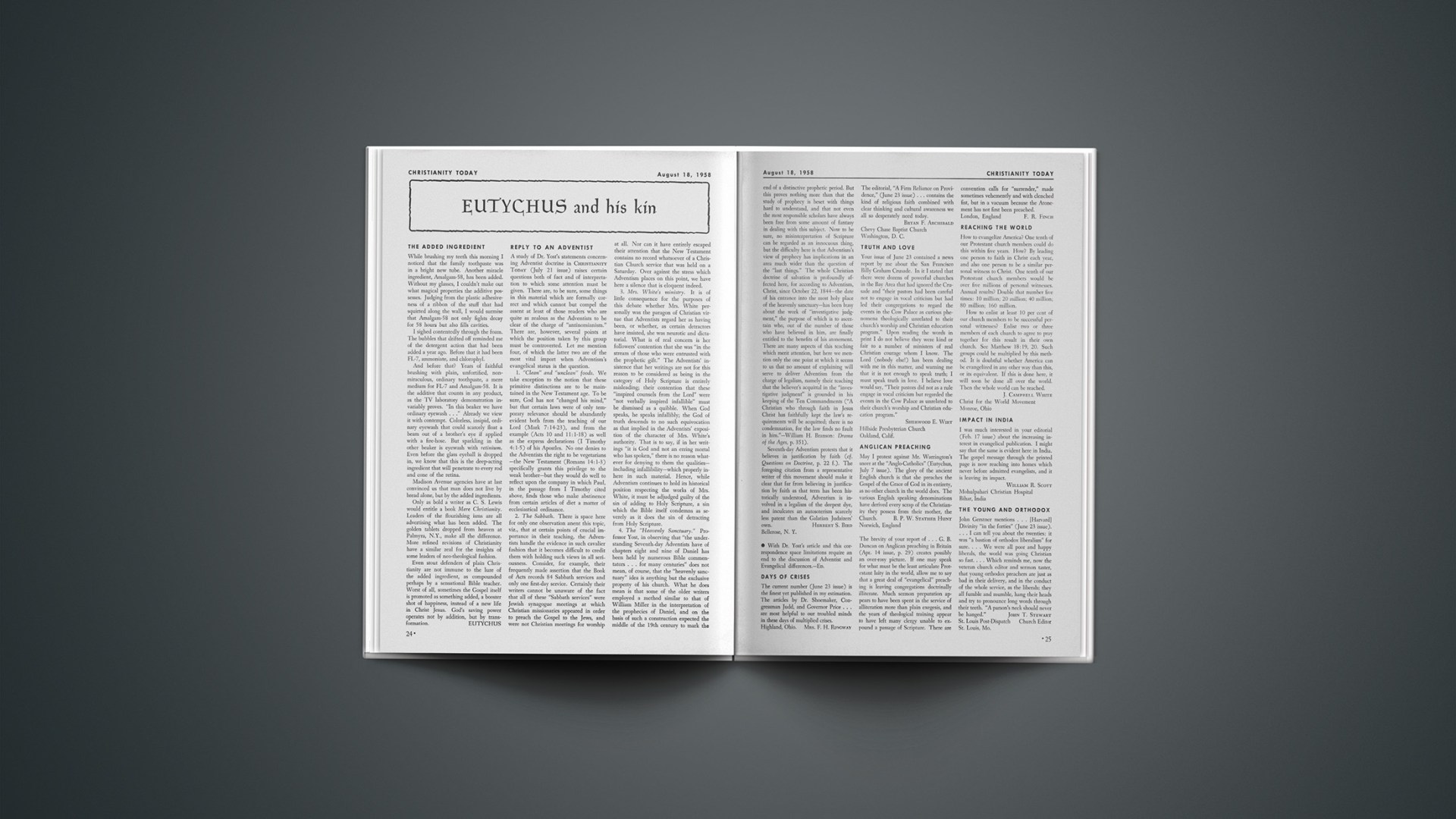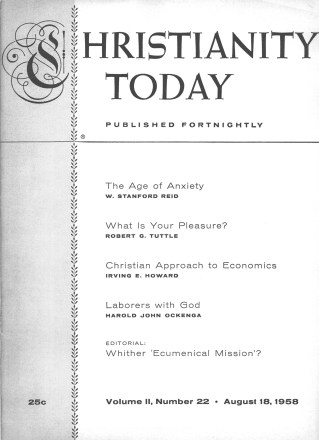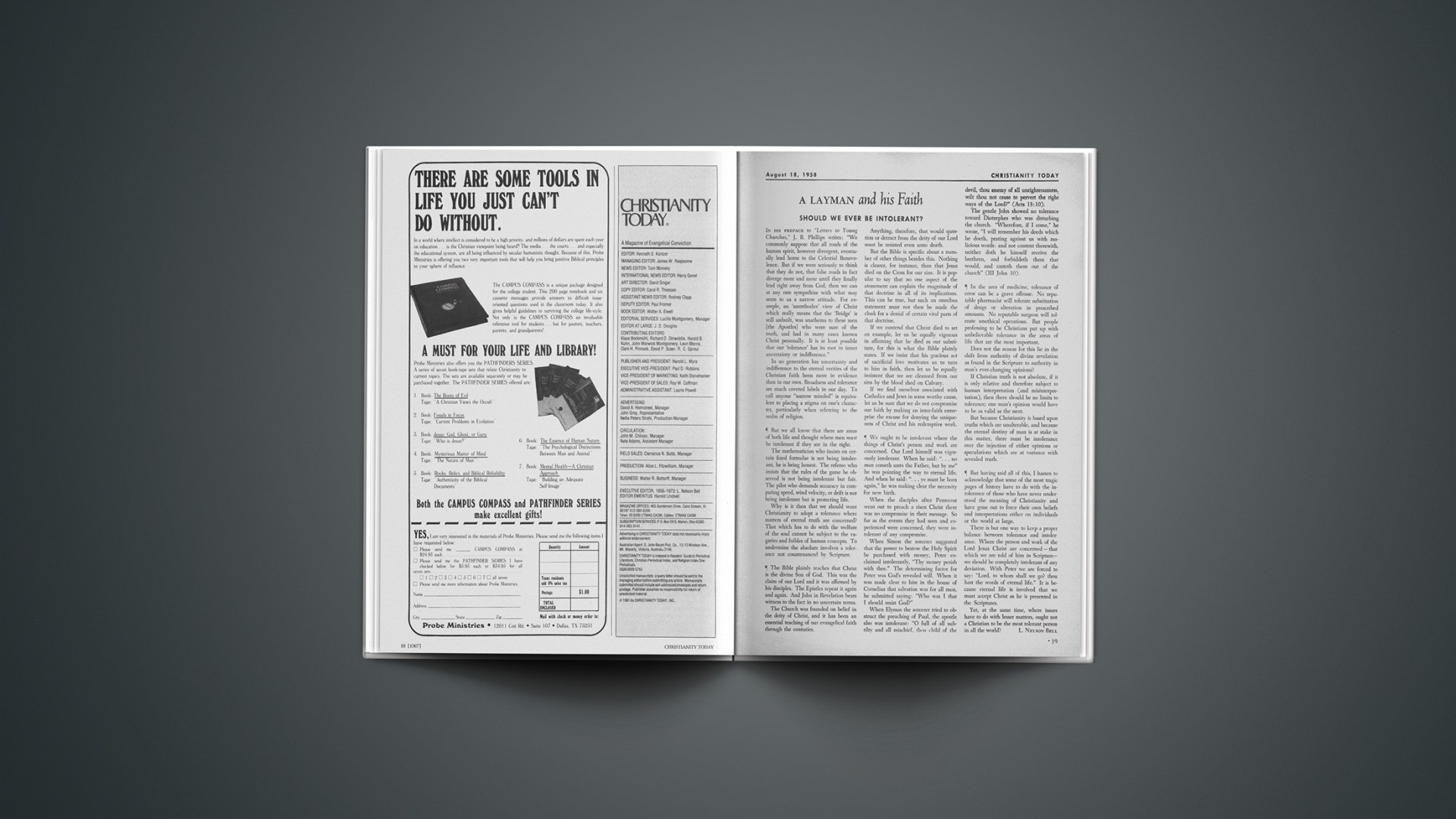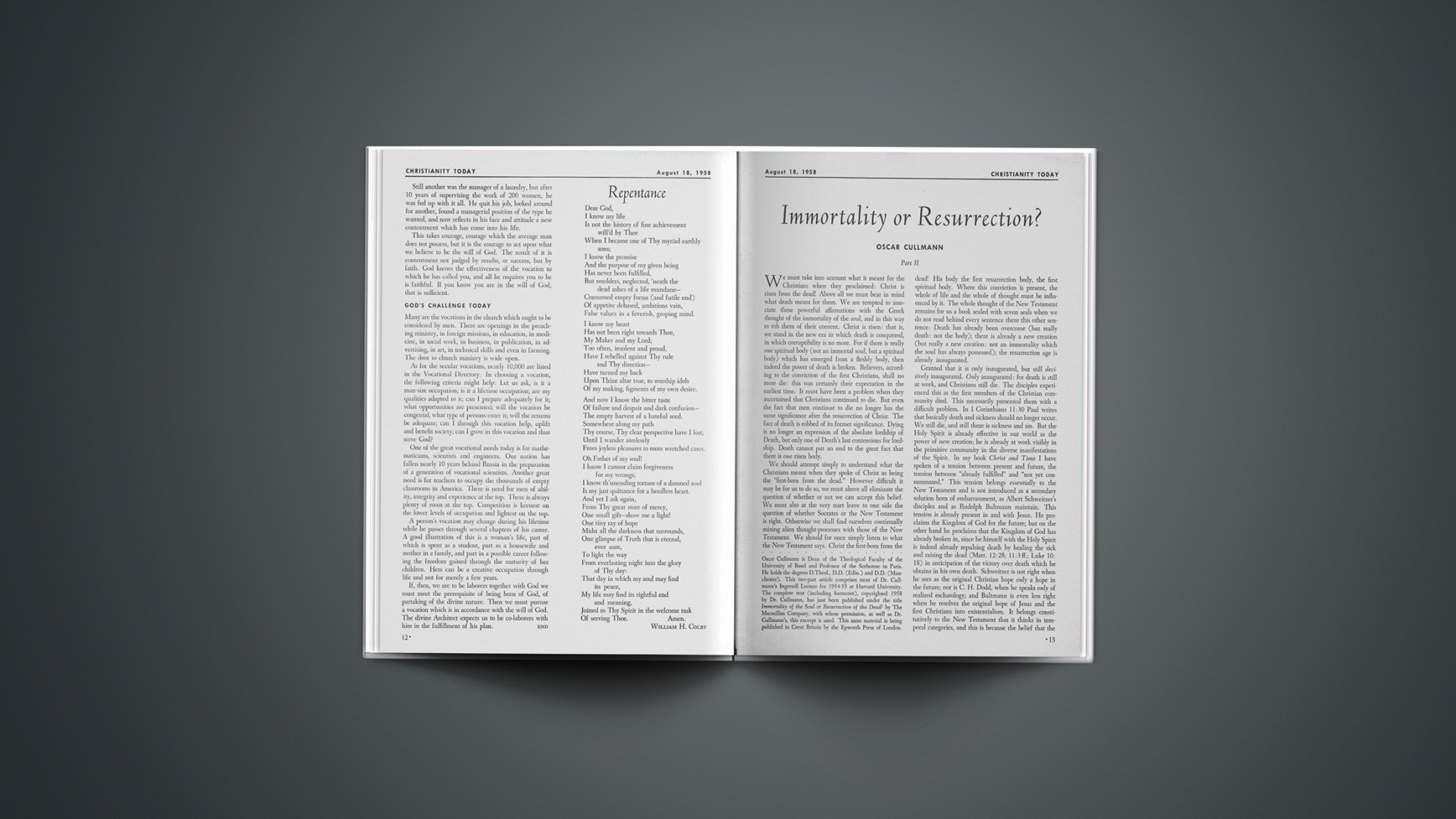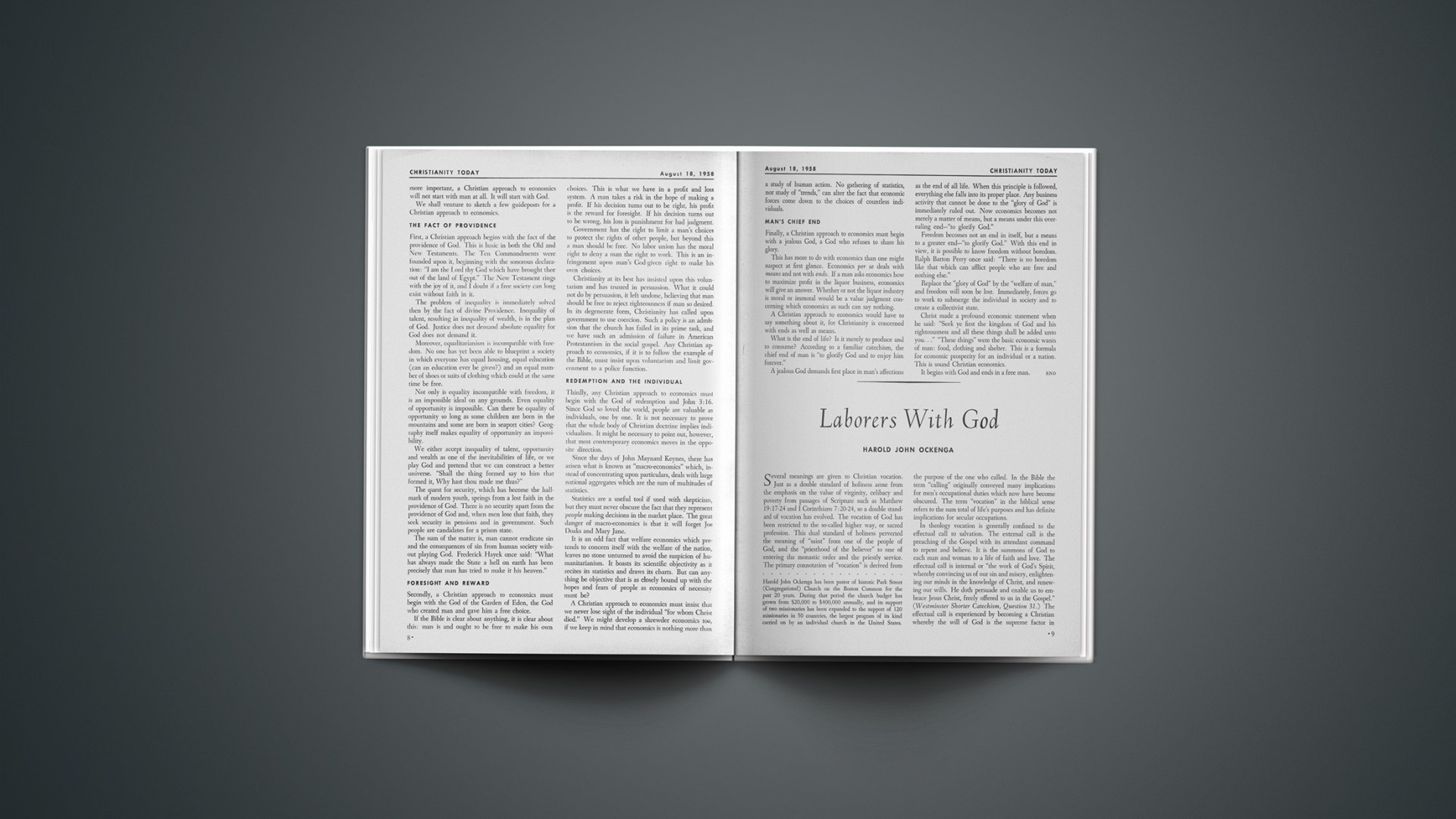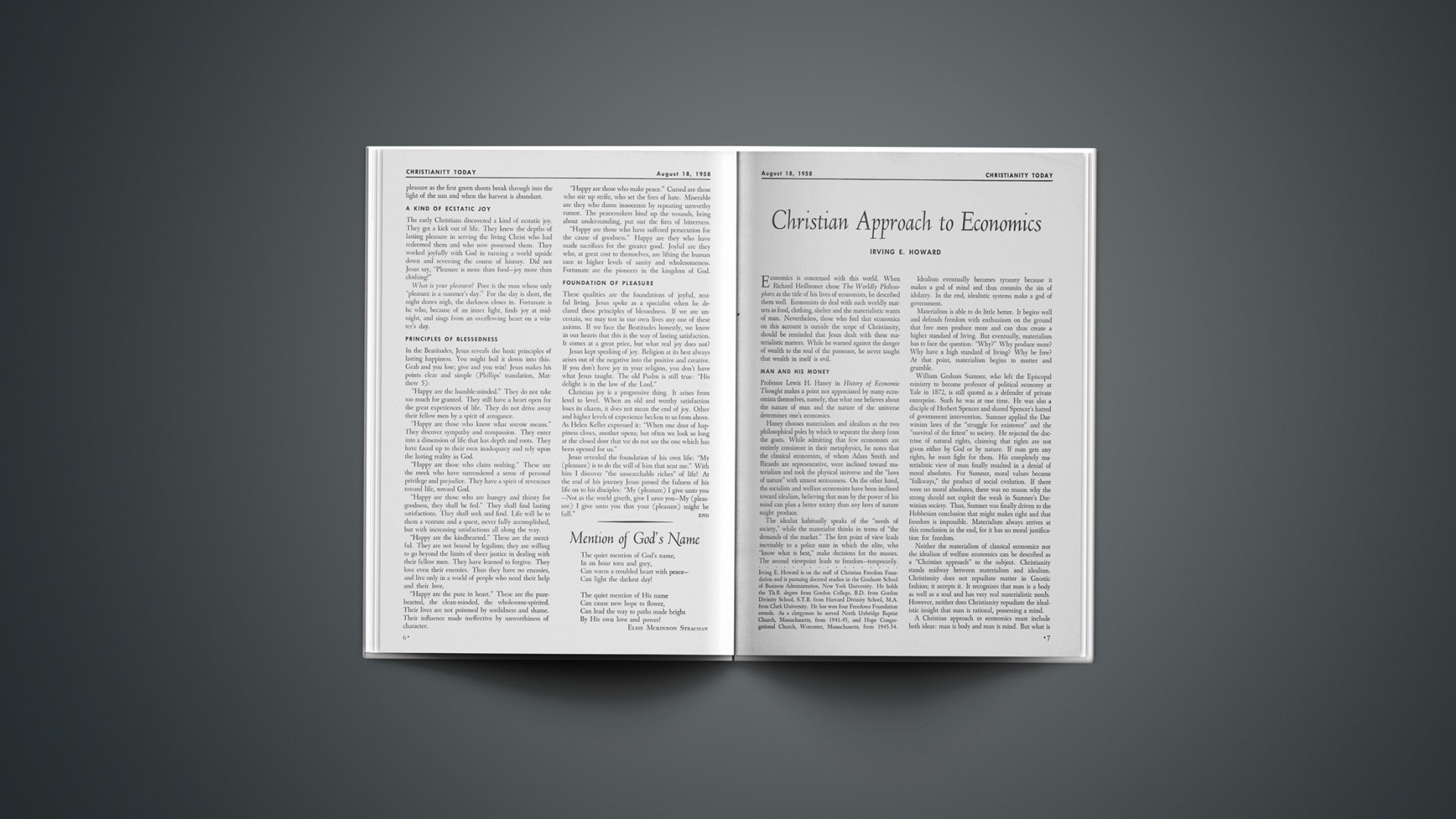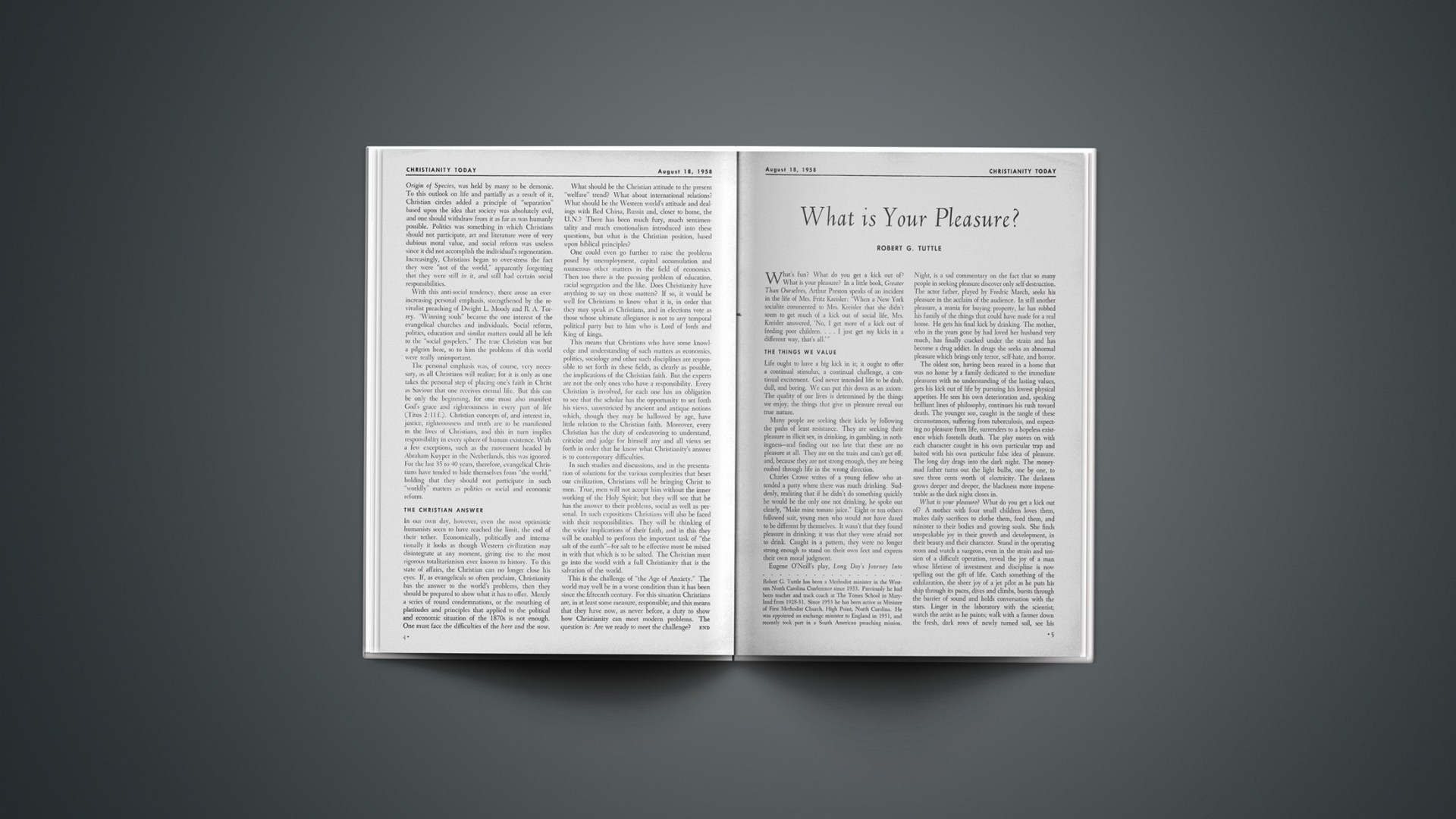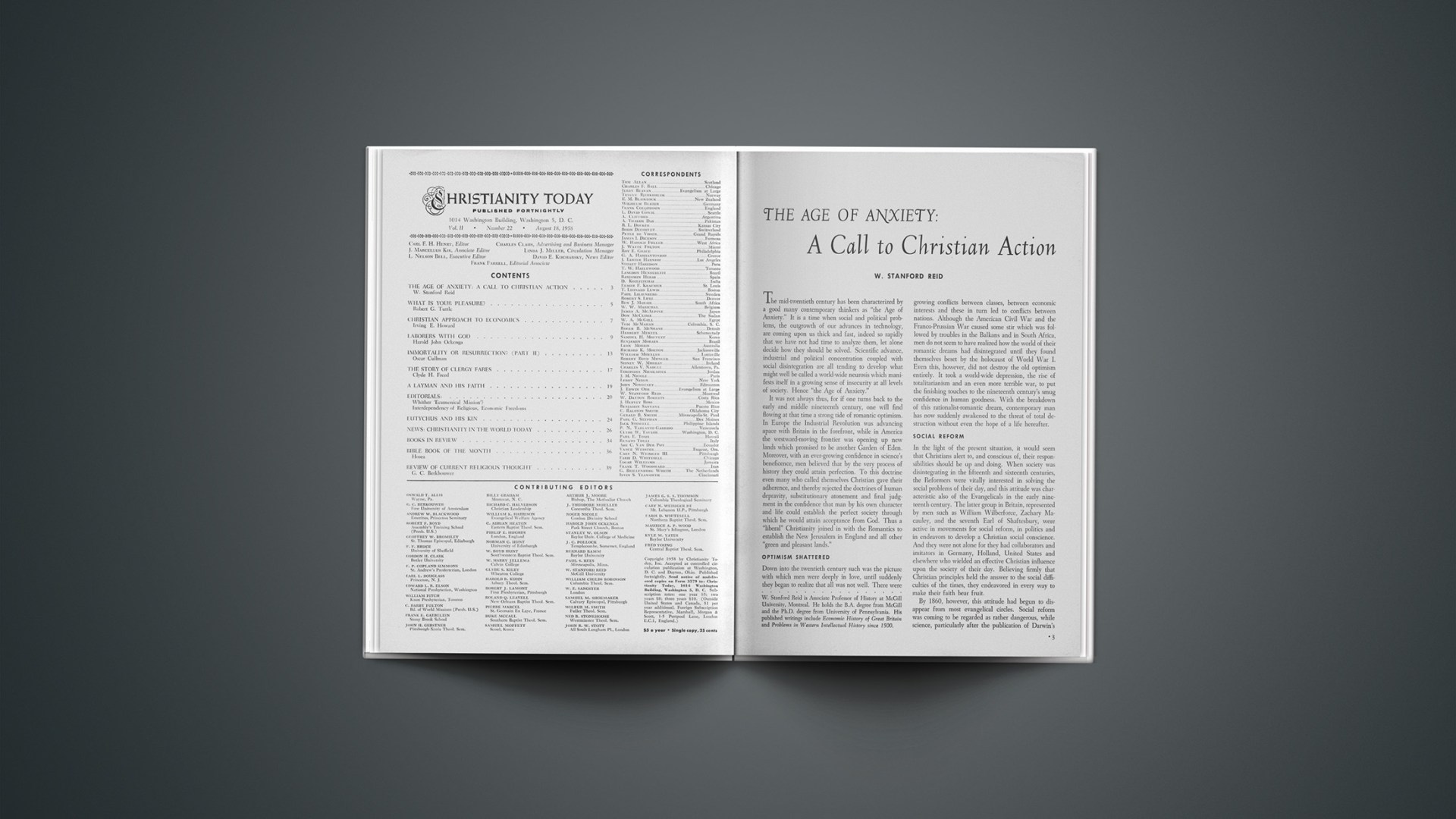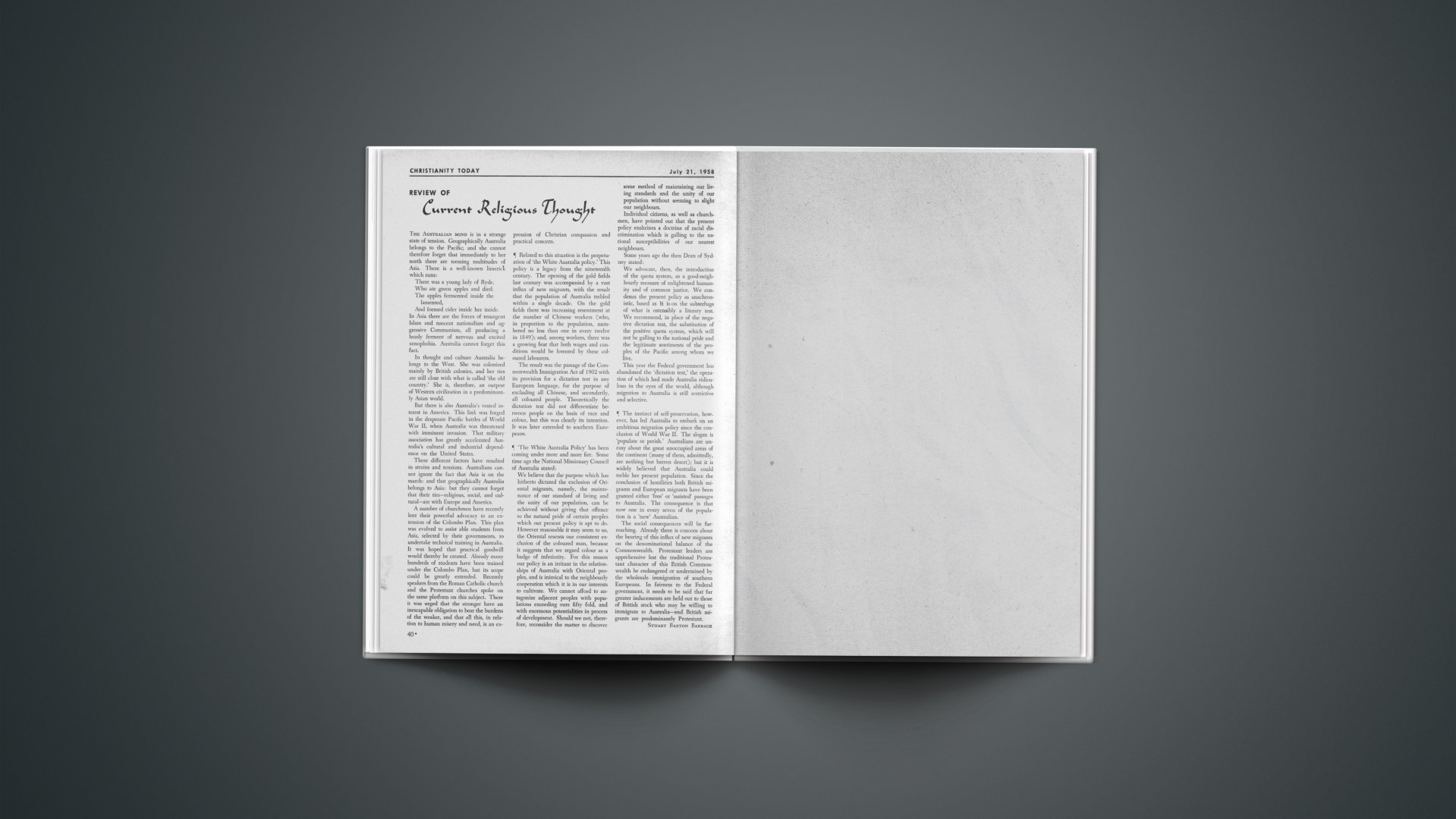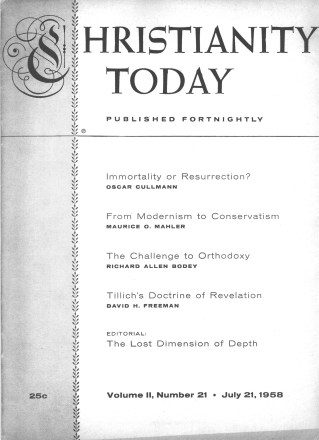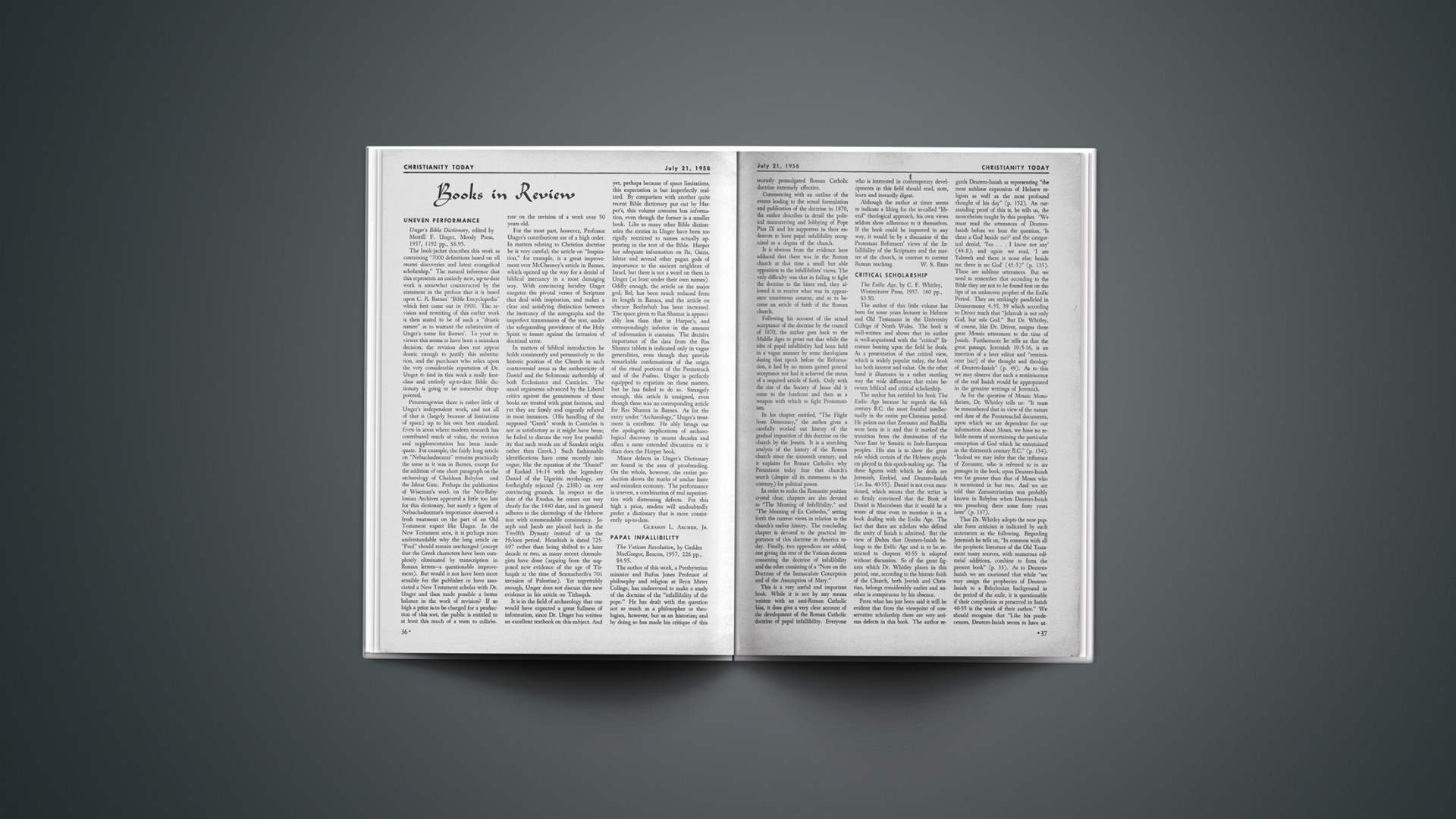THE ADDED INGREDIENT
While brushing my teeth this morning I noticed that the family toothpaste was in a bright new tube. Another miracle ingredient, Amalgam-58, has been added. Without my glasses, I couldn’t make out what magical properties the additive possesses. Judging from the plastic adhesiveness of a ribbon of the stuff that had squirted along the wall, I would surmise that Amalgam-58 not only fights decay for 58 hours but also fills cavities.
I sighed contentedly through the foam. The bubbles that drifted off reminded me of the detergent action that had been added a year ago. Before that it had been FL-7, ammoniate, and chlorophyl.
And before that? Years of faithful brushing with plain, unfortified, non-miraculous, ordinary toothpaste, a mere medium for FL-7 and Amalgam-58. It is the additive that counts in any product, as the TV laboratory demonstration invariably proves. “In this beaker we have ordinary eyewash …” Already we view it with contempt. Colorless, insipid, ordinary eyewash that could scarcely float a beam out of a brother’s eye if applied with a fire-hose. But sparkling in the other beaker is eyewash with retinium. Even before the glass eyeball is dropped in, we know that this is the deep-acting ingredient that will penetrate to every rod and cone of the retina.
Madison Avenue agencies have at last convinced us that man does not live by bread alone, but by the added ingredients.
Only as bold a writer as C. S. Lewis would entitle a book Mere Christianity. Leaders of the flourishing isms are all advertising what has been added. The golden tablets dropped from heaven at Palmyra, N.Y., make all the difference. More refined revisions of Christianity have a similar zeal for the insights of some leaders of neo-theological fashion.
Even stout defenders of plain Christianity are not immune to the lure of the added ingredient, as compounded perhaps by a sensational Bible teacher. Worst of all, sometimes the Gospel itself is promoted as something added, a booster shot of happiness, instead of a new life in Christ Jesus. God’s saving power operates not by addition, but by transformation.
REPLY TO AN ADVENTIST
A study of Dr. Yost’s statements concerning Adventist doctrine in CHRISTIANITY TODAY (July 21 issue) raises certain questions both of fact and of interpretation to which some attention must be given. There are, to be sure, some things in this material which are formally correct and which cannot but compel the assent at least of those readers who are quite as zealous as the Adventists to be clear of the charge of “antinomianism.” There are, however, several points at which the position taken by this group must be controverted. Let me mention four, of which the latter two are of the most vital import when Adventism’s evangelical status is the question.
1. “Clean” and “unclean” foods. We take exception to the notion that these primitive distinctions are to be maintained in the New Testament age. To be sure, God has not “changed his mind,” but that certain laws were of only temporary relevance should be abundantly evident both from the teaching of our Lord (Mark 7:14–23), and from the example (Acts 10 and 11:1–18) as well as the express declarations (1 Timothy 4:1–5) of his Apostles. No one denies to the Adventists the right to be vegetarians—the New Testament (Romans 14:1–3) specifically grants this privilege to the weak brother—but they would do well to reflect upon the company in which Paul, in the passage from I Timothy cited above, finds those who make abstinence from certain articles of diet a matter of ecclesiastical ordinance.
2. The Sabbath. There is space here for only one observation anent this topic, viz., that at certain points of crucial importance in their teaching, the Adventists handle the evidence in such cavalier fashion that it becomes difficult to credit them with holding such views in all seriousness. Consider, for example, their frequently made assertion that the Book of Acts records 84 Sabbath services and only one first-day service. Certainly their writers cannot be unaware of the fact that all of these “Sabbath services” were Jewish synagogue meetings at which Christian missionaries appeared in order to preach the Gospel to the Jews, and were not Christian meetings for worship
at all. Nor can it have entirely escaped their attention that the New Testament contains no record whatsoever of a Christian Church service that was held on a Saturday. Over against the stress which Adventism places on this point, we have here a silence that is eloquent indeed.
3. Mrs. White’s ministry. It is of little consequence for the purposes of this debate whether Mrs. White personally was the paragon of Christian virtue that Adventists regard her as having been, or whether, as certain detractors have insisted, she was neurotic and dictatorial. What is of real concern is her followers’ contention that she was “in the stream of those who were entrusted with the prophetic gift.” The Adventists’ insistence that her writings are not for this reason to be considered as being in the category of Holy Scripture is entirely misleading; their contention that these “inspired counsels from the Lord” were “not verbally inspired infallible” must be dismissed as a quibble. When God speaks, he speaks infallibly; the God of truth descends to no such equivocation as that implied in the Adventists’ exposition of the character of Mrs. White’s authority. That is to say, if in her writings “it is God and not an erring mortal who has spoken,” there is no reason whatever for denying to them the qualities—including infallibility—which properly inhere in such material. Hence, while Adventism continues to hold its historical position respecting the works of Mrs. White, it must be adjudged guilty of the sin of adding to Holy Scripture, a sin which the Bible itself condemns as severely as it does the sin of detracting from Holy Scripture.
4. The “Heavenly Sanctuary.” Professor Yost, in observing that “the understanding Seventh-day Adventists have of chapters eight and nine of Daniel has been held by numerous Bible commentators … for many centuries” does not mean, of course, that the “heavenly sanctuary” idea is anything but the exclusive property of his church. What he does mean is that some of the older writers employed a method similar to that of William Miller in the interpretation of the prophecies of Daniel, and on the basis of such a construction expected the middle of the 19th century to mark the end of a distinctive prophetic period. But this proves nothing more than that the study of prophecy is beset with things hard to understand, and that not even the most responsible scholars have always been free from some amount of fantasy in dealing with this subject. Now to be sure, no misinterpretation of Scripture can be regarded as an innocuous thing, but the difficulty here is that Adventism’s view of prophecy has implications in an area much wider than the question of the “last things.” The whole Christian doctrine of salvation is profoundly affected here, for according to Adventism, Christ, since October 22, 1844—the date of his entrance into the most holy place of the heavenly sanctuary—has been busy about the work of “investigative judgment,” the purpose of which is to ascertain who, out of the number of those who have believed in him, are finally entitled to the benefits of his atonement. There are many aspects of this teaching which merit attention, but here we mention only the one point at which it seems to us that no amount of explaining will serve to deliver Adventism from the charge of legalism, namely their teaching that the believer’s acquittal in the “investigative judgment” is grounded in his keeping of the Ten Commandments (“A Christian who through faith in Jesus Christ has faithfully kept the law’s requirements will be acquitted; there is no condemnation, for the law finds no fault in him.”—William H. Branson: Drama of the Ages, p. 351).
Seventh-day Adventism protests that it believes in justification by faith (cf. Questions on Doctrine, p. 22 f.). The foregoing citation from a representative writer of this movement should make it clear that far from believing in justification by faith as that term has been historically understood, Adventism is involved in a legalism of the deepest dye, and inculcates an autosoterism scarcely less patent than the Galatian Judaizers’ own.
Bellerose, N. Y.
• With Dr. Yost’s article and this correspondence space limitations require an end to the discussion of Adventist and Evangelical differences.—ED.
DAYS OF CRISES
The current number (June 23 issue) is the finest yet published in my estimation. The articles by Dr. Shoemaker, Congressman Judd, and Governor Price … are most helpful to our troubled minds in these days of multiplied crises.
Highland, Ohio.
The editorial, “A Firm Reliance on Providence,” (June 23 issue) … contains the kind of religious faith combined with clear thinking and cultural awareness we all so desperately need today.
Chevy Chase Baptist Church
Washington, D. C.
TRUTH AND LOVE
Your issue of June 23 contained a news report by me about the San Francisco Billy Graham Crusade. In it I stated that there were dozens of powerful churches in the Bay Area that had ignored the Crusade and “their pastors had been careful not to engage in vocal criticism but had led their congregations to regard the events in the Cow Palace as curious phenomena theologically unrelated to their church’s worship and Christian education program.” Upon reading the words in print I do not believe they were kind or fair to a number of ministers of real Christian courage whom I know. The Lord (nobody else!) has been dealing with me in this matter, and warning me that it is not enough to speak truth; I must speak truth in love. I believe love would say, “Their pastors did not as a rule engage in vocal criticism but regarded the events in the Cow Palace as unrelated to their church’s worship and Christian education program.”
Hillside Presbyterian Church
Oakland, Calif.
ANGLICAN PREACHING
May I protest against Mr. Warrington’s sneer at the “Anglo-Catholics” (Eutychus, July 7 issue). The glory of the ancient English church is that she preaches the Gospel of the Grace of God in its entirety, as no other church in the world does. The various English speaking denominations have derived every scrap of the Christianity they possess from their mother, the Church.
Norwich, England
The brevity of your report of … G. B. Duncan on Anglican preaching in Britain (Apr. 14 issue, p. 29) creates possibly an over-rosy picture. If one may speak for what must be the least articulate Protestant laity in the world, allow me to say that a great deal of “evangelical” preaching is leaving congregations doctrinally illiterate. Much sermon preparation appears to have been spent in the service of alliteration more than plain exegesis, and the years of theological training appear to have left many clergy unable to expound a passage of Scripture. There are convention calls for “surrender,” made sometimes vehemently and with clenched fist, but in a vacuum because the Atonement has not first been preached.
London, England
REACHING THE WORLD
How to evangelize America? One tenth of our Protestant church members could do this within five years. How? By leading one person to faith in Christ each year, and also one person to be a similar personal witness to Christ. One tenth of our Protestant church members would be over five millions of personal witnesses. Annual results? Double that number five times:10 million; 20 million; 40 million; 80 million; 160 million.
How to enlist at least 10 per cent of our church members to be successful personal witnesses? Enlist two or three members of each church to agree to pray together for this result in their own church. See Matthew 18:19, 20. Such groups could be multiplied by this method. It is doubtful whether America can be evangelized in any other way than this, or its equivalent. If this is done here, it will soon be done all over the world. Then the whole world can be reached.
Christ for the World Movement
Monroe, Ohio
IMPACT IN INDIA
I was much interested in your editorial (Feb. 17 issue) about the increasing interest in evangelical publication. I might say that the same is evident here in India. The gospel message through the printed page is now reaching into homes which never before admitted evangelists, and it is leaving its impact.
Mohulpahari Christian Hospital
Bihar, India
THE YOUNG AND ORTHODOX
John Gerstner mentions … [Harvard] Divinity “in the forties” (June 23 issue).… I can tell you about the twenties: it was “a bastion of orthodox liberalism” for sure.… We were all poor and happy liberals, the world was going Christian so fast.… Which reminds me, now the veteran church editor and sermon taster, that young orthodox preachers are just as bad in their delivery, and in the conduct of the whole service, as the liberals; they all fumble and mumble, hang their heads and try to pronounce long words through their teeth. “A parson’s neck should never be hanged.”
Church Editor
St. Louis Post-Dispatch
St. Louis, Mo.

